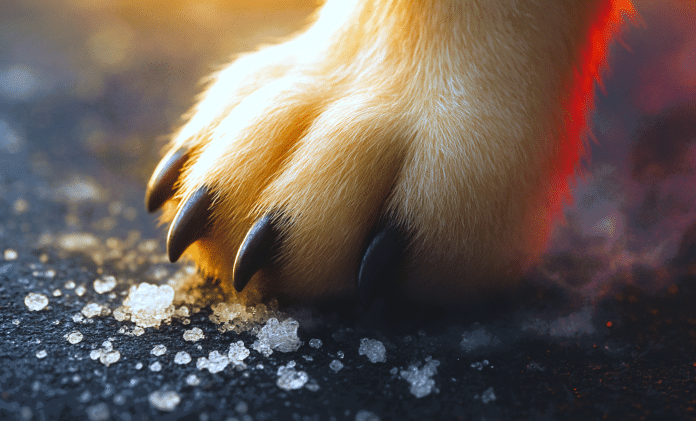Detroit, MI – As the first winter snow and lake-effect flurries sweep across Michigan, veterinarians are warning pet owners to protect their animals from more than just the cold. The road salt and chemical de-icers used heavily across the state can burn paw pads, irritate skin, and cause toxic reactions if pets lick or ingest them.
Most ice-melt products used in the Great Lakes region contain sodium chloride, calcium chloride, or magnesium chloride, compounds that help melt snow and ice but can cause dryness, cracking, and chemical burns to paw pads. When dogs lick their feet after exposure, they may ingest these chemicals, leading to vomiting, diarrhea, excessive thirst, or lethargy. Severe cases of salt poisoning can cause seizures or kidney failure, according to veterinarians.
Experts note that Michigan’s high volume of road salt use—particularly in metro areas and along highways—makes exposure nearly unavoidable. Some commercial ice melts also contain industrial residues or heavy metals, increasing the risk of long-term toxicity for pets exposed repeatedly during winter walks.
To prevent harm, veterinarians recommend rinsing pets’ paws with warm water after each walk and drying them thoroughly. Applying a paw balm or wax before going outside can create a protective barrier, while trimming fur between the toes helps prevent ice and salt buildup. Booties offer an added layer of protection for dogs that tolerate them. Homeowners are urged to switch to chloride-free, pet-safe ice melts for their own driveways and sidewalks.
With temperatures falling into the 20s and teens across much of Michigan, road crews are already laying salt ahead of heavier snow. Veterinarians advise owners to keep walks short and monitor for limping, licking, or hesitation—early signs of salt irritation or chemical burns.
As winter weather tightens its grip on the Great Lakes, experts emphasize that the biggest seasonal threat to pets isn’t always the snow—it’s the chemicals coating the ground beneath their paws.




